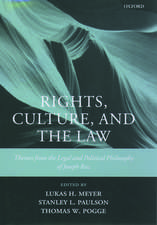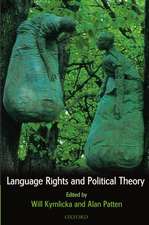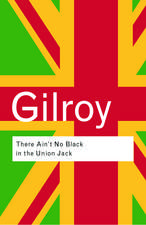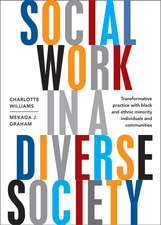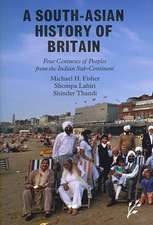Race and Ethnicity in Latin American History
Autor Vincent Pelosoen Limba Engleză Hardback – 6 dec 2013
In Race and Ethnicity in Latin American History, Vincent Peloso traces the story of ethnicity and race in Latin America from the sixteenth century to the contemporary period. In a short, synthetic narrative, he lays the groundwork for students to understand how the history of colonial racism is connected to the problems of racism in today’s Latin American societies. With features including timelines, plentiful maps and illustrations, and boxes highlighting important historical figures, the text provides a clear and accessible introduction to the complex subject of race and ethnicity in the history of Latin America.
| Toate formatele și edițiile | Preț | Express |
|---|---|---|
| Paperback (1) | 383.63 lei 6-8 săpt. | |
| Taylor & Francis – 4 dec 2013 | 383.63 lei 6-8 săpt. | |
| Hardback (1) | 764.20 lei 6-8 săpt. | |
| Taylor & Francis – 6 dec 2013 | 764.20 lei 6-8 săpt. |
Preț: 764.20 lei
Preț vechi: 1027.40 lei
-26% Nou
Puncte Express: 1146
Preț estimativ în valută:
146.25€ • 152.49$ • 121.54£
146.25€ • 152.49$ • 121.54£
Carte tipărită la comandă
Livrare economică 21 martie-04 aprilie
Preluare comenzi: 021 569.72.76
Specificații
ISBN-13: 9780415991520
ISBN-10: 0415991528
Pagini: 232
Ilustrații: 20 halftones and Follow African American People but adapt for 6 x 9
Dimensiuni: 152 x 229 x 20 mm
Greutate: 0.45 kg
Ediția:1
Editura: Taylor & Francis
Colecția Routledge
Locul publicării:Oxford, United Kingdom
ISBN-10: 0415991528
Pagini: 232
Ilustrații: 20 halftones and Follow African American People but adapt for 6 x 9
Dimensiuni: 152 x 229 x 20 mm
Greutate: 0.45 kg
Ediția:1
Editura: Taylor & Francis
Colecția Routledge
Locul publicării:Oxford, United Kingdom
Public țintă
UndergraduateCuprins
Preface Introduction 1. The Sixteenth-Century Encounter, 1492-1550 2. The Seventeenth-Century Decline, 1580-1715 3. The Transitional Eighteenth Century, 1715-1825 4. New States and Struggles for Ethno-Racial Hegemony, 1820-1910 5. Ethnicity, Race, and National Identity, 1890-1960 6. Ethnicity and Race in the Late Twentieth Century.
Notă biografică
Vincent C. Peloso is Professor of History Emeritus at Howard University.
Recenzii
"Race and Ethnicity in Latin American History is a magisterial synthesis of the highest caliber. Patient in its pace, yet succinct and comprehensive, part of Peloso's accomplishment is his ability to tackle critical themes of regional development--the impact of race and ethnicity--and trace them through the sweep of history from colonial to modern times. Along the way, Peloso defines slippery concepts, connects disparate national histories, and illuminates the value of adopting a race-focused perspective towards interpreting the social relations of Latin America. An indispensable guide and introduction to the topic, Race and Ethnicity will surely emerge as an instant classic, providing essential reading for scholars, students, and curious laypersons."
– Ben Vinson III, co-editor of Black Mexico: Race and Society from Colonial to Modern Times
"Written in an easily accessible style, Race and Ethnicity in Latin American History implicitly and explicitly makes two very important but often overlooked points. The first is that the region is not only extremely diverse but also that each individual country is diverse geographically and demographically making generalizations inordinately difficult. The second is that throughout the history of the region race and ethnicity have played significant roles depending on time, location and political circumstances. Understanding the present reality in any given state requires an understanding of its peculiar history and circumstances."
– Franklin W. Knight, editor of Slave Societies of the Caribbean
"Professor Peloso offers us an important and thought-provoking way to approach the Latin American past and present. He recreates five centuries of Latin America’s history through a clear and compelling exploration of ethnic identity, race relations, and the tragic consequences of persistent racism. Peloso’s vision of a continent’s past is original, spirited, and undeniable."
– Matthew Restall, author of The Black Middle: Africans, Mayas, and Spaniards in Colonial Yucatan
– Ben Vinson III, co-editor of Black Mexico: Race and Society from Colonial to Modern Times
"Written in an easily accessible style, Race and Ethnicity in Latin American History implicitly and explicitly makes two very important but often overlooked points. The first is that the region is not only extremely diverse but also that each individual country is diverse geographically and demographically making generalizations inordinately difficult. The second is that throughout the history of the region race and ethnicity have played significant roles depending on time, location and political circumstances. Understanding the present reality in any given state requires an understanding of its peculiar history and circumstances."
– Franklin W. Knight, editor of Slave Societies of the Caribbean
"Professor Peloso offers us an important and thought-provoking way to approach the Latin American past and present. He recreates five centuries of Latin America’s history through a clear and compelling exploration of ethnic identity, race relations, and the tragic consequences of persistent racism. Peloso’s vision of a continent’s past is original, spirited, and undeniable."
– Matthew Restall, author of The Black Middle: Africans, Mayas, and Spaniards in Colonial Yucatan
Descriere
The Spanish and Portuguese empires that existed in America for over three hundred years resulted in the creation of a new world population in which racial and ethnic distinctions were embedded in the discourse of power. Vincent Peloso goes back to the beginning, tracing the development of the Latin American colonies and the gradual build-up of institutional and social barriers of both race and ethnicity, and the implications of this system for the colonial whites, the indigenous people, and the African slaves that were imported as plantation labor. Race and Ethnicity in Latin American History lays the groundwork for students to consider the history of the region and how the legacy of colonial racism has led to the issues and problems of racism in today’s modern Latin American society.




